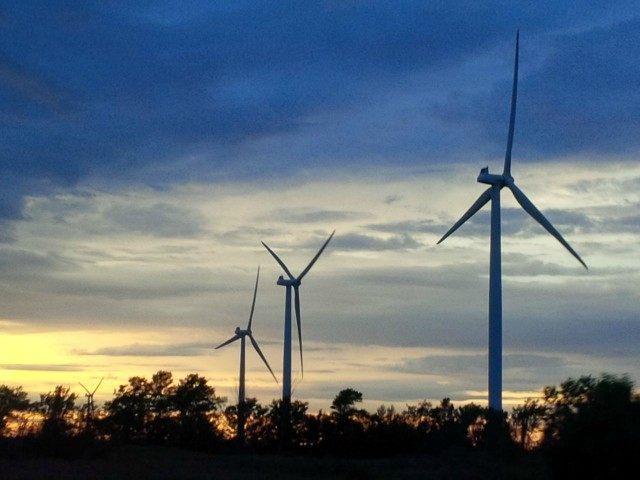When you’re fighting an imaginary “problem,” symbolic victories are all you need.
The media is laboring mightily to make the global warming conference in Paris look like a smashing success that will change the course of history, even though participants will quietly admit even their best-case wish list of climate-change measures wouldn’t have done much to affect the conditions forecast by their computer models.
This isn’t about science, though – it’s about politics, more specifically political control of the economy, and subduing the population is vital. The Islamic State clearly wasn’t even slightly “rebuked” by the Paris confab, as President Obama promised it would be… but if you feel rebuked, it’s Mission Accomplished.
Thus we have a load of headlines and sound bites about how “the end of the fossil fuel era” and Paris has put oil decisively on “the wrong side of history” – which is, not coincidentally, the same term our effete ruling class and inept President Obama use to describe ISIS terrorism. Meanwhile, as New York magazine noted, many proponents of the Paris plan “agree that its value is more about symbolism and hoped-for gains than near-term substance, and critics are zooming in on the agreement’s lack of legal teeth, as well as how optimistic it seems to be about future international cooperation, technological advancement, and the sustained domestic will within each country.”
In other words, it’s another example of politics as the great enemy of economics. Modern left-wing politics is entirely premised on the idea that political will can trump economic reality, right down to the basic laws of supply and demand, which is very much like politicians trying to create the best luxury airliner ever by repealing the law of gravity and instructing the captain of the monster Oasis of the Seas cruise ship to ascend to 40,000 feet. They’re always trying to fool the public into abandoning reasonable cost/benefit analysis, either by claiming the cost is near-zero, or the benefits are priceless.
This attitude is perfectly captured in the first few paragraphs of the Bloomberg Business report on Paris:
Saving the world isn’t going to be cheap. If you sell oil, coal or old-fashioned cars, that threatens disaster. For makers of stuff like solar panels, high-tech home insulation, and efficient lighting, it’s a potential miracle.
That’s the bottom line from this weekend’s climate deal in Paris, which commits 195 countries to reducing pollution in order to head off dangerous climate change.
Global governments and companies are counting the costs and benefits from the agreement, which calls for wholesale transformations of energy, transportation, and dozens of other lines of business. Fossil-fuel producers and countries that depend on them face massive, costly disruption. Players in up-and-coming industries like renewable power and energy efficiency are looking at an unprecedented opportunity.
What a deceptive load of hooey!
If any of the grandees in Paris was put on trial and forced to prove the existence of this “dangerous climate change,” they’d all end up behind bars. They’d all cop plea bargains before going on trial to prove their deal would do anything significant to “head it off” – it’s a symbolic agreement with little practical value. And saying that “saving the world isn’t going to be cheap” is a characteristically dishonest way to put it. We’re not talking about spending a little more than the penny-pinching cheapskates want – we’re talking about the wholesale devastation of advanced economies, if everything these lefty politicians desire came to pass. Even their fallback agenda costs billions of dollars, while doing nothing empirically demonstrable to “save the world.”
Also, the situation climate alarmists wish to bring about is not a “miracle” for their green-energy cronies. The money doesn’t fall from the sky – it’s seized by force and redistributed as subsidies. There’s nothing miraculous about propping up disastrous, unsustainable business plans with huge taxpayer subsidies. There’s nothing “up and coming” about an industry that can’t get within a light-year of providing reliable energy at prices consumers are actually willing to pay.
Green-energy enthusiasts often complain that low oil prices are subsidized by government, so their energy preferences should be subsidized as well. It would be a very different world indeed if we dispensed with all government meddling and allowed prices to more honestly reflect supply and demand, but unless that becomes the case, it makes far more sense to support energy sources that can actually meet consumer needs, rather than forcing taxpayers to subsidize boutique industries for the satisfaction of political elites and their cronies. Providing tax benefits to mainstream energy companies is very different from using regulations and subsidies to conjure a “green energy” market into existence.
Also, there’s a big difference between extending tax breaks to profitable companies with desirable products, versus outright subsidies for lousy business models that could not survive without them. The value of a tax break depends on income and profit – it means more to a company that pays more taxes. Subsidies, on the other hand, are paid at the same value to even the most absurd basket-case industries. There is little incentive to perform, beyond arbitrary targets the political class adjusts as it sees fit, while refusing to admit any of their billion-dollar initiatives is a failure. There is no mechanism to prevent politicians from throwing good money after bad.
Even as the media was blasting out headlines about the destiny of mankind changing in Paris, India announced it would not change its plans to double its coal output. Climate-change delusions are an expensive luxury developing economies cannot afford, and no amount of political hectoring will convince them the side of history that makes economic sense is the Wrong Side of History.
Perhaps one day we’ll have “green energy” consumers are voluntarily willing to purchase, at levels that would actually begin moving industry away from traditional energy sources in a significant way, but that day has not yet arrived.

COMMENTS
Please let us know if you're having issues with commenting.